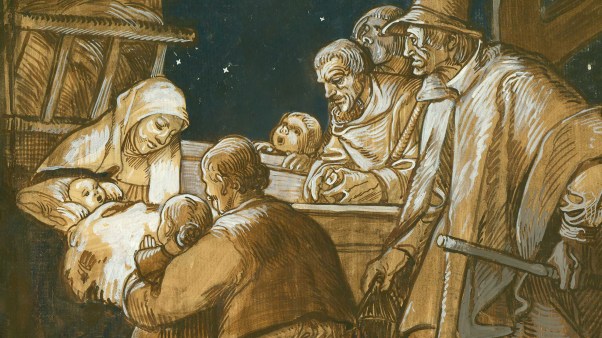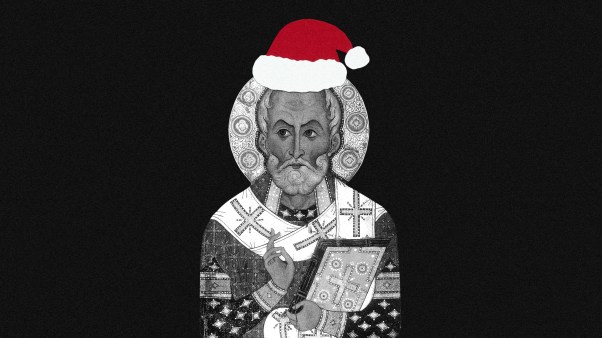A passenger on a recent plane trip happily divulged his spiritual views. Raised in a conservative religious home, he proudly dismissed traditional Christianity, with its radical claims about Jesus of Nazareth, because it substitutes dogma for reason, he said. Fifteen minutes later, he became an apologist for a sacred cosmos, with tarot cards and astrology. But of course, he said, these were true just for him.
The encounter epitomized what we have all experienced in a culture that identifies reason with naturalism and faith with feeling. And it comes from a deeper problem: the attempt to "climb to heaven" on the rungs of reason, morality, and experience. The "search for the sacred" is what happens when our God-centered nature is taken captive by sin. Religion and spirituality are all about what we feel and think deep within our precious, delightful, individual souls. The true God calls us outdoors into a history that sweeps us into its wake. Yet we prefer to sit inside our own souls and minds, stewing in our own juices.
Biblical faith emphasizes that we cannot ascend to God on our own; rather, the God of the Bible descends down to us. Our inner self is not the playground of "spirit," but the haunted plains on which we build our towers of Babel. In other words, our hearts are idol factories, in bondage to sin and spin. As Jeremiah declared, "The heart is deceitful above all things, and desperately sick; who can understand it?" (17:9, ESV, used throughout). We look for a god we can manage rather than the God who is actually there.
In Romans 1 and 2, Paul affirms this. He says that everyone knows God exists and is a sovereign, righteous, and all-knowing judge. Jew and Gentile alike know God's moral will and so "are without excuse," but "by their unrighteousness suppress the truth" (1:18-23). Quoting the psalmist, Paul presents the universal indictment: "… all, both Jews and Greeks, are under sin, as it is written, 'None is righteous, no, not one; no one understands; no one seeks for God. All have turned aside; together they have become worthless; no one does good, not even one'?" (Rom. 3:9-12).
Given all this, we need to receive an external word from outside our hearts and to our hearts—one that stops our spin and gives us new hearts even as it is spoken. That's just where Paul turns next in Romans:
But now the righteousness of God has been manifested apart from the law, although the Law and the Prophets bear witness to it—the righteousness of God through faith in Jesus Christ for all who believe. For there is no distinction: for all have sinned and fall short of the glory of God, and are justified by his grace as a gift, through the redemption that is in Christ Jesus …. (3:21-24)
In other words, our hearts create spiritualities, therapies, and programs that arise out of our natural knowledge of the law, which we distort. Outside our hearts, and at the core of special revelation, is the surprising God, known uniquely in his Son.
There are, however, strong forces that tempt us to grasp the divine on our own accord.
Enslaved to Naturalism
Many people today act like someone created a peace treaty between reason and faith after reason won the war. Reason cedes territory to faith, as long as faith relinquishes its rational claims. Reason is in the realm of public, objective truth, while faith is relegated to the realm of private experience and personal therapy. So, responding to my airplane acquaintance, who said faith is "whatever works for you," I said, "Would you say that about World War II—that it happened for me but not for you?" Of course, the resurrection of Christ is more significant than the Battle of the Bulge, but no less historical.
Several years ago, I had the privilege of sharing a couple days with noted philosopher Richard Rorty. He repeated his claim that religion is a conversation stopper in public arguments, since it rests on private opinion. I asked him if shifting from philosophical and moral claims to a historical one—namely, that Jesus rose from the dead—would make a difference. After hearing me sketch that claim, he replied, "Yes, aside from the merit of the case itself, that would place Christian faith out in the open, exposed to public criticism."
"And," I interrupted, "public faith."
"Yes, of course," he conceded. "Public arguments of any kind can go either way," he added. "But that's not the kind of argument I often hear." Rorty didn't profess faith in Christ after our conversation. In fact, he argued that "truth" is a social construction. But he admitted that staking Christian discourse on historical claims was different from basing it on private sentiments.
We live in a world that assumes reason is unbiased, when in fact our reason itself is enslaved to naturalism: a denial of the world's dependence on God for its creation and preservation, much less redemption. Any valid argument or evidence that suggests otherwise must have a naturalistic explanation, even if that explanation is the least reasonable. To be a rational person is to be a practical atheist, whatever spiritual hobbies one takes up on the weekends. Reason rests on public facts; faith, on private values. When it comes to faith, you can believe whatever you want, as long as you don't think it's true for everyone else. You can have faith in whatever makes you happy, as long as you don't presume to evaluate my faith. After all, it's mine: deeply personal and not open to public inspection. And reducing the gospel to "Jesus in my heart" is going to fit in perfectly on the island of subjective individualism to which our age has relegated faith.
This leaves us paralyzed, unable to understand the faith as more than childish whim, personal therapy, or a leap in the dark. We feel compelled to make faith adhere to naturalism, which our culture calls reason. We may downplay the biblical miracles, or describe prayer as "practicing silence," or think of the kingdom of God primarily as a manifesto for social reform and of Jesus as a great teacher. Reason opens its gate to mundane good advice, not to miraculous good news; deeds are authorized, but creeds are dangerous. The pressure to conform our faith to the rules of naturalism is powerful.
Many people today act like someone has created a peace treaty between reason and faith after reason won the war.
And if we share the gospel with others, we're accused of "proselytizing," which is code for pushing private beliefs on others. Thus, for many, evangelism is antiquated, replaced by good works that show the love of Jesus. No doubt we should show the love of Jesus in deed. But if Paul is right, people will come to know Christ only through our public testimony—the one thing our culture precludes, except when the likeminded meet as a voluntary association (Rom. 10).
The question for Christians, and anyone seeking to know God, is: On what basis can we know and trust God? And how can we trust that we know God, and have a knowledge that emboldens us to speak the gospel in our culture and live in a way that befits it?
The Way God Comes
The divide between faith and reason is often linked to postmodernism. But it goes back much further, to the Enlightenment. The philosopher Immanuel Kant (1724-1804) distinguished between a universal morality ("pure religion") and particular religions, with their specific creeds and forms of worship ("ecclesiastical faiths"). God cannot be an object of intellectual knowledge, Kant argued, but can only serve as a basis for action (deeds not creeds).
Kant argued that "the moral law" in each of us is authoritative. Therefore, what Christianity calls general revelation—a universal awareness of God's existence and moral will—is the content of all real spirituality, said Kant. We don't need special revelation, since we already have everything we need for improving ourselves and our world. Of course, people can go on believing miracle reports and practicing the rituals of their particular religion, but they do so on nonrational grounds.
What is genuinely postmodern is denying even Kant's idea of a universal moral intuition. That, too, says postmodernism, depends on personal choice and cultural conditioning. So now, not only the gospel but also the law is something we make up in our search for personal meaning and practical living.
Special revelation is precisely where the Christian faith breaks down the wall our culture has erected between faith and reason. We see this uniquely in the Incarnation, as Christ takes on human flesh, and first, by the way in which God delivers this special revelation.
The Incarnation presents to us the odd truth that the particular is not a shadow of the universal, on a lower rung of creaturely things. Rather, the gospel says the most particular thing—a Jewish rabbi in first-century Palestine—is the universal. And we can't reason, intuit, or experience our way to this reality; we can only meet it first as history.
We hold to this claim for important reasons. First, our "search for the sacred" is warped by idolatry. God is incomprehensible in his essence: immortal, invisible, eternal, unapproachable Light (1 Tim. 6:15-16), the sight of whose face we cannot survive (Ex. 33:20). God doesn't contradict reason, but transcends it infinitely (Isa. 55:8-9; Rom. 11:33).
If this were all we knew, then we might throw up our hands and conclude with the radical mystics and skeptics that we cannot really know God, at least in a rational way that we can put into words.
However, Scripture tells us more: God stoops to our capacity, accommodating our understanding. We know him according to his works, not his essence. We know that God is merciful, for example, because he has acted mercifully in history and revealed these actions as well as their interpretation through prophets and apostles. We cannot discover God in his hidden essence. And yet, we find him where he has descended to us, in the humility of a feeding trough, a cross, and frail human language.
Special revelation, especially the Incarnation, is precisely where the Christian faith breaks down the wall our culture has erected between faith and reason.
John's gospel especially emphasizes that Jesus, the Son who existed with the Father before creation, came down from heaven. He tells the world what he has heard from the Father, and fulfills the work his Father has given him to do. Jesus knows the Father in a unique way, being one with the Father eternally and coming from the Father (John 6:46, 51; 8:19), declaring the Father's word: "Truly, truly, I say to you, before Abraham was, I am" (8:58), and, "I and the Father are one" (10:30). This is the Creator of heaven and earth, come among us full of grace and truth.
This Jewish rabbi not only shows us the way, but is "the way, and the truth, and the life." "No one comes to the Father except through me," he adds. "If you had known me, you would have known my Father also. From now on you do know him and have seen him" (John 14:6-7). After Jesus repeatedly states such things, you can imagine his exasperation when Philip responds, "Lord, show us the Father, and it is enough for us." To this, Jesus replies, "Have I been with you so long, and you still do not know me, Philip? Whoever has seen me has seen the Father" (14:8-9).
I get Philip; it's Jesus I find strange. We prefer to climb up to God through argument, experience, and activity. But God has climbed down to us, meeting us not in the "high places" we erect, but in the lowest places: in a barn, suffering our scorn, fellowshipping with sinners, and hanging on a cross. We don't ascend from particulars to universals. Rather, the source of all universal truth has descended to us in the concrete particulars of human history.
Of course, we see signs of the objective nature of the gospel before the Incarnation. The Old Testament prophets weren't spiritual prodigies, "special ones." They were ordinary people, going about their ordinary vocations, when God addressed them and commissioned them to deliver his Word. Their guidance counselors never said, "Hey, you have a real aptitude for religion; have you thought about becoming a prophet?" The truth did not bubble up inside them, but came to them. God's message surprised them as much as it did their contemporaries. And God's message chiefly concerned Israel's judgment according to the law and the everlasting covenant of grace, which would be fulfilled and dispensed with the Messiah's arrival.
There is no passable route from us to God. We cannot climb the ladder of mysticism, speculation, or merit. In pride, we try to rise to heaven through reason, but God descends to us in humility and self-sacrificial generosity. We seek the truth within ourselves or in universal laws derived from our moral intuition, but God surprises us—and his name is Jesus.
This is partly why the gospel is scandalous: not because it's irrational and subjective, but precisely because here, faith refuses to remain on the Alcatraz of private opinion. The gospel is also a scandal because of what it announces: a radical rescue operation amid a radical problem (God's wrath). The gospel exposes that our claim to be defenders of reason is based on an irrational decision to ignore history and to stand in defiance of our own intuition that we are shipwrecked and need rescue. Left to ourselves, we use reason so irrationally that we determine that God cannot enter history, even before we examine whether he has done so. Again, it's not "neutral reason" running the show here, but a blind faith in naturalism.
While we were looking for "God" in the glorious splendor of our inner lights and universal morality, the Son became the most scandalously particular yet historically accessible revelation of God. It's not private therapy or rational argument, but a public announcement:
In the beginning was the Word, and the Word was with God, and the Word was God. He was in the beginning with God. All things were made through him, and without him was not any thing made that was made …. And the Word became flesh and dwelt among us, and we have seen his glory, glory as of the only Son from the Father, full of grace and truth. (John 1:1-3, 14)
The problem for devout Jews in Jesus' day wasn't naturalism, of course, but Jesus' assumption of the titles, works, and identity of God. To them, this was blasphemy.
Gentiles had a different problem with Jesus. Their world was shaped by Plato and the Stoics. In their culture, the Logos was the rational principle that pervaded all reality; by rational contemplation, one could ascend from particulars of the everyday "lower world" to the "upper world" of universal ideas. In that environment, John's gospel makes the unprecedented claim that the Logos is a person (not merely a principle of reason), that he is God (not a semidivine intermediary), and—especially scandalous—that he became flesh. For students of Plato, that cannot happen, because philosophy teaches us so. Yet, it did happen; history teaches us so.
What happens when God grows up in the neighborhood? Or presents himself on the road, as he did with his dejected disciples? This God didn't wait for us to discover him; he spoke and acted first. As a result, the gospel creates not speculative pundits, spiritual gurus, or moralists, but witnesses.
Condemned—and Justified
Second, the gospel tears down the wall between reason and faith, public and private, objective and subjective truth, by its very content. We need special revelation because we need to be saved. That puts the matter squarely on the historical claims of the gospel: the death, burial, and resurrection of Jesus. The whole question of a self-revealing God is taken out of the merely private realm; it's public truth.
Those who follow their hearts fashion an idol that never judges or offends. According to Kant and his heirs, we are not helpless sinners who need redemption; therefore, we don't need a special revelation delivered to a particular people at a particular time through miraculous means. We have everything we need within, and it's universal, so why base belief on an external word miraculously delivered to a people in a particular time and place? If we follow our best lights, we'll be fine. Like Monty Python's victims of the plague, Kant and his ilk said, "We're getting better."
Paul says that even Gentiles know God's moral law within, but it's not saving knowledge. Rather, God's righteousness revealed in the law condemns all, "so that every mouth may be stopped, and the whole world may be held accountable to God" (Rom. 3:19). This revelation doesn't encourage us to "become a better you," but leaves us without excuse. So a religion of law—of general revelation—or even a religion of the holy law revealed to Israel may reliably show us God. But apart from the gospel, it's a God we would want nothing to do with.
And this is where things get interesting: "But now the righteousness of God has been manifested apart from the law, although the Law and the Prophets bear witness to it—the righteousness of God through faith in Jesus Christ for all who believe" (vv. 21-22). God's general revelation of his righteous judgment leaves us condemned. But God's special revelation of his gift of righteousness through faith in Christ leaves us justified (vv. 23-26).
Special revelation identifies and intensifies that guilt and alienation we feel when we discern that there's a holy God. Yet it also brings a surprising announcement: a promise that moves history forward, around all the obstacles of human rebellion (even Israel's) to its fulfillment in Christ. From the life, death, and resurrection of Christ, a light has dawned over this dark planet. It revives every blade of grass and reveals the grandeur of general revelation as well.
Modern culture approves the universal element in religion (namely, the search for transcendent meaning and moral improvement). It also leases space to faith, as long as it stays "indoors." The important thing in religion is the moral law within, not external creeds or rituals. But for Christians, it is exactly the reverse. The gospel preached and administered in baptism and Communion does not make a point about something else; it is the point. It comes from God, not from us, and it sweeps us, heart and all, into the new creation. Whatever intuitions and spiritual principles we drag up from the basements of our hearts, however practical, will lead only to ruin, and we will alternate between despair and self-righteousness.
The gospel is wildly improbable—except that it happened. The gospel is not the conclusion of a logical syllogism or an intuition of our universal moral experience. It's not a timeless truth. Rather, it is the announcement that "when the fullness of time had come, God sent forth his Son, born of woman, born under the law, to redeem those who were under the law, so that we might receive adoption as sons" (Gal. 4:4-5).
Related Themes
Like all doctrine, the classic Christian doctrine of revelation closely relates to others.
In Scripture, the gift of faith is always attributed to the Word, specifically to the gospel. "So faith comes by hearing, and hearing through the word of Christ" (Rom. 10:17). We "have been born again, not of perishable seed but of imperishable, through the living and abiding word of God …. And this word is the good news that was preached to you" (1 Pet. 1:23, 25). Every word from God's mouth is essential, but Peter marvels at the fact that by his preaching "the Gentiles should hear the word of the gospel and believe" (Acts 15:7).
This suggests that this doctrine—Jesus as the revelation of God—is closely connected to another doctrine that answers other questions: How do we come to know the God who lived, died, and rose in Jesus Christ long ago? How does this historical revelation become a personal reality and not just another personal opinion? Such questions usually relate to the doctrine of the Holy Spirit.
This teaching also hinges on the reliability of Scripture. It assumes that the Bible is a faithful testimony of what God has done and said through the prophets and apostles. Even aside from the internal witness of the Holy Spirit, we have good reasons to believe in the Bible's trustworthiness (but this, too, we will have to discuss at another juncture).
As we embark on this series on the great doctrines of the church, we must begin at the beginning, especially in light of our culture. It strives to relegate faith to the purely personal arena, or to ground religion on universal premises or moral law. We need to see from the beginning how the gospel transcends these rules, and refuses to play by them.
The gospel creates not speculative pundits, spiritual gurus, or moralists, but 'witnesses'.
Yes, there are some great rational arguments for God's existence. The Grand Canyon displays his majesty; the laughter of a child, his love. The universal sense of duty exhibits a justice that transcends positive laws. The myriad ways of pleasing an offended deity—or force, fate, or whatever—in diverse religions testifies, however dimly, to God's righteous character. We may discern someone or something above natural processes: a designer and architect. Numerous constitutions, legal codes, and declarations of human rights affirm biblical commands.
Yet none of this reveals the God of mercy, who has promised and fulfilled our redemption in Jesus Christ. Speaking for myself, I can say that any god who might exist apart from the gospel is not only irrelevant but also dreadful. If such a god existed, we would well wish otherwise. But thank God it is otherwise. The Protestant Reformers may have put it best: "We know God the Father only in his Son as he clothes himself in the gospel"—a revelation of the Good News of who God is.
Michael Horton is professor of theology at Westminster Seminary California. He is the author of many books, most recently The Christian Faith: A Systematic Theology for Pilgrims on the Way (Zondervan).
Copyright © 2011 Christianity Today. Click for reprint information.
Related Elsewhere:
See our accompanying articles in the launch of the Global Gospel Project:
Making Disciples Today: Christianity Today's New Global Gospel Projec | Introducing Christianity Today's new five-year teaching venture.
Nurturing Mind and Soul | A systematic beginning for an old cause. (Inside CT)
Previous CT articles about theology and the incarnation include:
How to Read the Bible | New strategies for interpreting Scripture turn out to be not so new—and deepen our life in Christ. (October 7, 2011)
Holy Incarnation! | It may be impossible not to "demean God" since he mixed it up with sinners. (September 30, 2010)
Surveying the Wondrous Cross | Understanding the Atonement is about more than grasping a theory. (May 27, 2009)
Ongoing Incarnation | Would Christmas have come even if we had not sinned? (January 10, 2008)
Other CT articles by or about Michael Horton include:
The Death of Osama bin Laden: What Kind of Justice Has Been Done? | The news should again remind us of the difference between the City of Man and the City of God. (May 2, 2011)
Christ at the Center | Michael Horton says we need to once again let our lives and churches be driven by the gospel. (November 19, 2009)
How the Kingdom Comes | The church becomes countercultural by sinking its roots ever deeper into God's heavenly gifts. (January 1, 2006)










